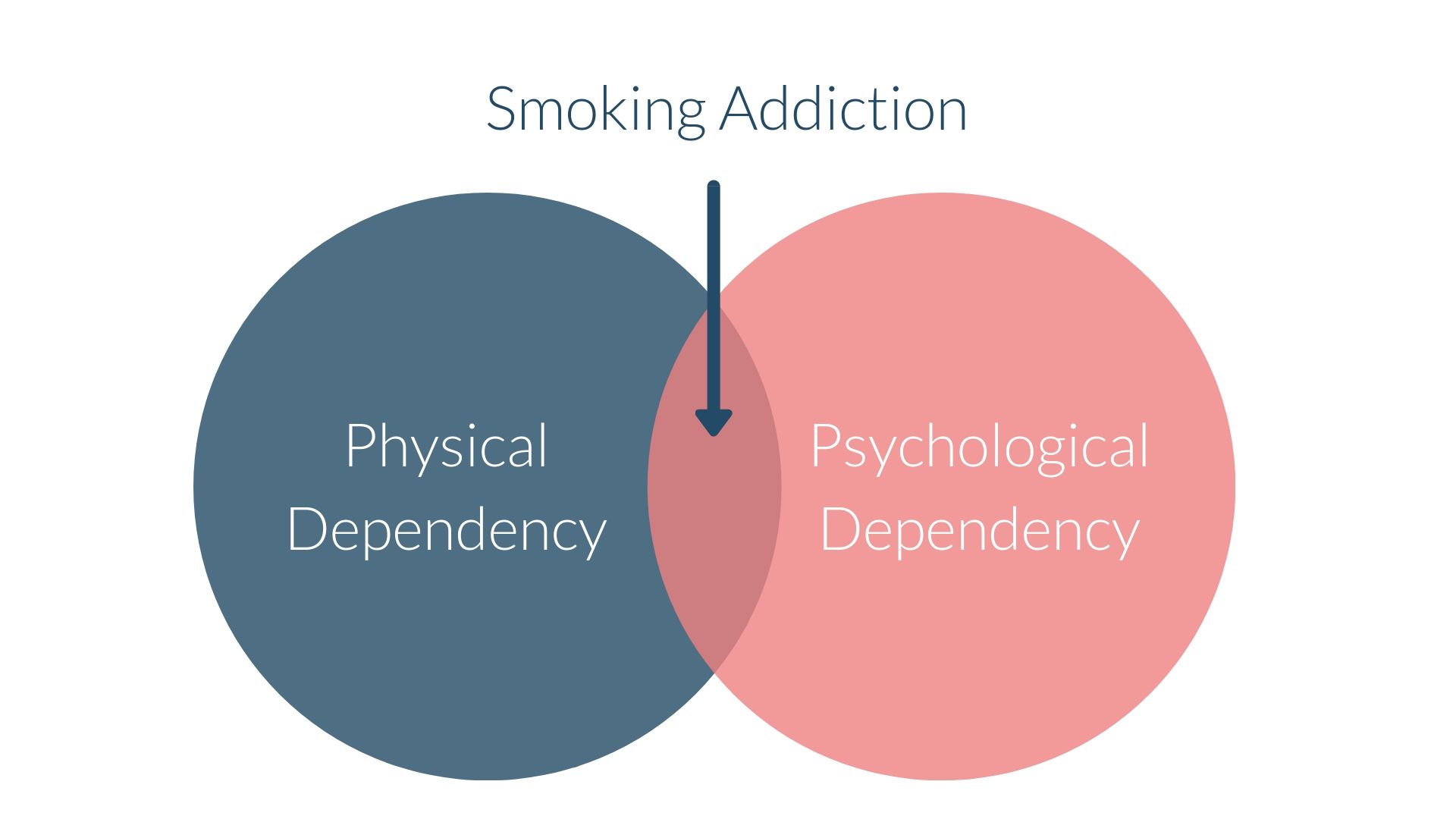The Two Faces Of Addiction – How Cigarettes Keep You Hooked And What To Do About It

Undoubtedly, smoking has its benefits. Why else are there more than a billion smokers in the world?

Quite simply, cigarettes get their addictive nature from two different sources. First, there's the physical effect that nicotine has on the human brain. But that's just one aspect of it. We'll explore both in this post.

Physical Dependency
Physical dependency is relatively straight-forward. A cigarette is an efficient and highly engineered drug-delivery system Nicotine is an addictive substance and it’s what gets you hooked in the first place.
In essence, it works like this: After you inhale cigarette smoke, your blood quickly absorbs nicotine. Less than ten seconds later, it reaches the brain. That’s where it activates receptors that in turn release a chemical called dopamine (the ‘feel good’ hormone). The result is the sweet feeling of relief you get from your first puff.
This pleasure response to dopamine is a big part of the nicotine addiction process. Consider this. An average smoker will take 10 puffs on a cigarette for about 5 minutes. That means that a person who smokes about one pack each day gets 200 nicotine hits to the brain. Every single day. Not hard to imagine how regular smoking changes the brain in certain ways. Millions of new nicotine receptors develop and they all want to be ‘fed’ with nicotine. That’s what creates your need to smoke.
Psychological Addiction
No wonder nicotine is highly addictive. However, that’s not the sole reason why it’s so hard to quit smoking. There’s another side to addiction which is often overlooked but incredibly important. The psychological addiction.
Virtually all smokers have certain situations, people or feelings that trigger their smoking. Cigarettes serve as a crutch to get through stressful or otherwise challenging days. You might enjoy the breaks at work that you take to smoke with your colleagues. The cigarette you smoke as a reward after a long work day. The morning cigarette that accompanies your coffee. Or the stress relief you get from taking regular timeouts to indulge in your smoking habit.
It’s often difficult to be aware of the psychological effects of smoking. Over time, the triggers, the subtle feelings of stress, the rituals to structure the day become automatic.
5 Strategies To Get Unhooked
Smokers who want to quit successfully need to tackle both the physical and the psychological side of addiction. That's why—for most people—the most effective way to tackle addiction is to use a combination of nicotine replacement therapy (NRT) and a guided therapy program to address the psychological addiction, like Stresscoach. Here's an overview of those strategies:
NRT. Nicotine replacement therapy helps ease the burden of quitting by gradually reducing the nicotine intake. Nicotine patches, gums and lozenges reduce cravings and can even limit weight gain. To see whether or not NRT is helpful in your situation you can test your level of addiction here.
Reframing unhelpful beliefs about smoking. The physical addiction typically last one to three months; the psychological addiction though can have you relapse even after years. The reason is that smokers develop unhelpful beliefs about smoking which need to be challenged systematically.
Pause-and-plan response. This innate physiological reaction is a trick to improve one's willpower. In order to activate the brain areas responsible for self-control you can activate the pause-and-plan response. Luckily, it's really simple. You slow down your breathing to about 4-6 breaths per minute. Do this for a three minutes and you'll find it much easier to deal with cravings.
5-minute timeout. Nicotine cravings don't last longer than five minutes. They can feel much longer but if you withstand for just a few minutes, you're good. That's why the 5-minute timeout is so helpful. It basically means distracting yourself for a few moments to get through cravings. Call a friend, play a game on your phone or make yourself a cup of tea.
De-linking triggers from smoking. Last but not least, there are many things around you that trigger your smoking . Especially at the beginning of your new life as a non-smoker, it's crucial that you identify your worst triggers and de-link them from your old habit. Instead of lighting up without thinking about it, this will allow you to form new, healthier habits.
Quitting is about applying these simple strategies systematically. You can go about it alone or get yourself a guide. Whatever you decide, remember this: The earlier you quit, the better for your health, your wallet and the people around you.
Quit smoking now
